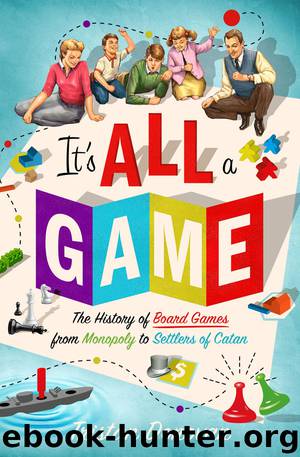It's All a Game by Tristan Donovan

Author:Tristan Donovan
Language: eng
Format: epub
Publisher: St. Martin's Press
10
PLASTIC FANTASTIC: MOUSE TRAP, OPERATION, AND THE WILLY WONKA OF TOYS
How Mouse Trap and Operation took board games into the plastic age
When Marvin Glass called, the toy and game industry jumped.
By the middle of the 1960s everyone in the toy world wanted to know what this five foot three, chain-smoking ball of nervous energy would do next. At trade shows people would clamor to see what he was up to and in their offices corporate executives daydreamed about receiving an invitation to Chicago to see the latest wonder to emerge from his secretive toy workshop. What mad, yet marvelous, idea would Glass come up with next?
The mind of the wiry man at the center of their attentions had always fizzed with visions of off-the-wall playthings. The son of Jewish immigrants from Germany, Glass was born on July 14, 1914, in the Chicago suburb of Evanston.
One of his earliest memories was exploding with rage as a four-year-old because the cardboard dog he had made wouldn’t wag its own tail. His dreams of better toys continued throughout his childhood. By eight he was building submarines that fired wooden torpedoes and making Roman helmets, swords, and shields for him and his friends. “I always played Caesar and I never got assassinated,” he told the Saturday Evening Post.
Glass’s time spent prancing around the streets dressed as a Roman emperor did little, however, to ease the boy’s loneliness. His relationship with his unhappily married parents was fraught at the best of times. His father, a six-foot-tall engineering consultant, would wonder aloud about his son’s meager frame and found the boy’s daydreaming a source of endless frustration.
“What do you want to be when you grow up?” his father would demand. “Nobody,” Glass would snarl back to his father’s fury.
Eventually his parents packed him off to a private military school in Wisconsin, doubtless hoping it would straighten their son out. Glass hated the school and retreated more and more into the world of toys, constructing models of pirate ships and Egyptian galleys to distract him from his misery. Toys, he later told reporters, were an escape from a “sordid and unsatisfactory world.” Toys cars never had fatal accidents, tin soldiers were never blown apart on the battlefield, and baby dolls never grew old. Toys were the world cut loose from misery, pain, and the specter of death.
The military school failed to change Glass and neither of his parents attended his graduation. After completing his psychology degree in 1935, Glass moved into a two-bedroom apartment on Ohio Street, in Chicago, with his friend Eoina Nudelman, and it was there that the boy who wanted to be nobody became somebody.
Nudelman designed store window displays and one day a customer asked if he could come up with an idea for a toy. He asked Glass for help and together the pair devised a projector that kids could use to illuminate comic strips. They sold their creation for five hundred dollars, which seemed fantastic until they learned that the manufacturer went on to earn more than thirty thousand dollars from the invention.
Download
This site does not store any files on its server. We only index and link to content provided by other sites. Please contact the content providers to delete copyright contents if any and email us, we'll remove relevant links or contents immediately.
| Coloring Books for Grown-Ups | Humor |
| Movies | Performing Arts |
| Pop Culture | Puzzles & Games |
| Radio | Sheet Music & Scores |
| Television | Trivia & Fun Facts |
The Infinite Retina by Robert Scoble Irena Cronin(6233)
Harry Potter and the Cursed Child: The Journey by Harry Potter Theatrical Productions(4487)
The Sports Rules Book by Human Kinetics(4369)
Molly's Game: From Hollywood's Elite to Wall Street's Billionaire Boys Club, My High-Stakes Adventure in the World of Underground Poker by Molly Bloom(3522)
A Knight of the Seven Kingdoms by George R R Martin(3305)
Quidditch Through the Ages by J.K. Rowling(3095)
How To by Randall Munroe(3095)
Flowers For Algernon by Daniel Keyes(3091)
Quidditch Through the Ages by J K Rowling & Kennilworthy Whisp(2960)
Stacked Decks by The Rotenberg Collection(2868)
Quidditch Through the Ages by Kennilworthy Whisp by J.K. Rowling(2843)
Quidditch through the Ages by J. K. Rowling(2787)
776 Stupidest Things Ever Said by Ross Petras(2766)
Quidditch Through The Ages by J. K. Rowling(2755)
Ready Player One: A Novel by Ernest Cline(2700)
What If?: Serious Scientific Answers to Absurd Hypothetical Questions by Randall Munroe(2691)
Beautiful Oblivion by Jamie McGuire(2596)
The Book of Questions: Revised and Updated by Gregory Stock Ph.d(2555)
Champions of Illusion by Susana Martinez-Conde & Stephen Macknik(2440)
